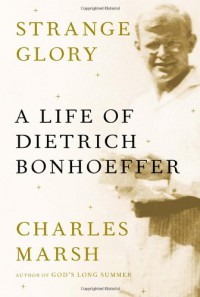fruitcakes
Strange Glory: A Life of Dietrich Bonhoeffer
 I listened to the Audible audiobook, and the reader was quite good. Somewhat dry, but the very dry delivery at the end is very moving.
I listened to the Audible audiobook, and the reader was quite good. Somewhat dry, but the very dry delivery at the end is very moving.The Dietrich Bonhoeffer presented in this book was very, very human. The author always made you very aware of how much a product of his environment and upbringing Bonhoeffer was, including the continuous, somewhat pointed mentions of how much material support Bonhoeffer enjoyed from his parents-- money for trips as a student, money and resources for his work with the illegal/underground seminaries, dealing with his mailed laundry, etc. The author also spends a decent amount of attention on the evolution of Bonhoeffer's theology, and how the experiences of his life drove that evolution.
Really liked the attention spent on Bonhoeffer's time studying in America, particularly his experiences with black churches there. The in-depth look at the impact on him as a person and on his theology and preaching was particularly fascinating, and not something I'd seen a lot of time on before.
Also liked how the author managed expectations of a reader's theological knowledge-- the amount and time that he spent on explaining differing schools of thought and what practical impact it had, both in relation to Bonhoeffer and not, seemed appropriate and sensical. I've got a decent background in Protestant theological thought, but nothing particularly extensive or focused on this time period, and I got through just fine, even if I had to Google the occasional mention. It never took away from the author's narrative or left me feeling confused, however.
One of the things that did occasionally frustrate me was how the author occasionally did a drive by drop in of judging about Bonhoeffer's personal relationships. I'm not just referring to the heavy implying that the author did that there was something kinda gay in Bonhoeffer's relationship with Bethge (Which, not to get into that really, but came across in this book as Bonhoeffer making it REAL weird), but also the weirdly judge-y, "I'm not gonna tell you what I think was going on there, but I'm going to imply it HEAVILY" thing he did with some of Bonhoeffer's childhood friendships, etc. Did we really, really need to bring up that the one girl who was his intellectual equal in school was Jewish *every single time*? What, exactly, are you trying to get at by doing so? What's up with the constantly comparing every woman he liked in his life to his twin? The role of a biographer is to make a narrative out of a life, but it felt like an academic who really wanted to maintain the shield of academic integrity-- it's not just me, this is the facts!! -- but who also really wanted to get their spin in on it. These little pricks mostly made me doubt the author, and want to go do a bunch of other reading on the subjects.
Currently reading
Fortune's Fool
Dragon Magic
Think of England
Selenium Design Patterns and Best Practices
Ascension: A Tangled Axon Novel
The Killing Moon
The Shores of Spain









